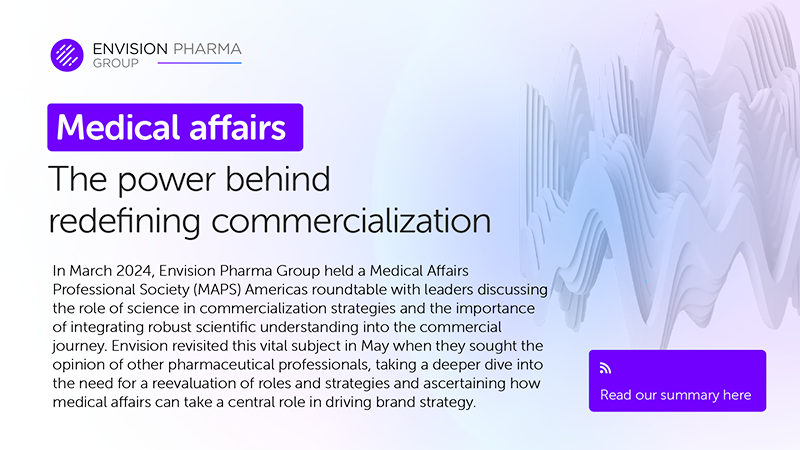In March 2024, Envision Pharma Group held a Medical Affairs Professional Society (MAPS) Americas roundtable with leaders discussing the role of science in commercialization strategies and the importance of integrating robust scientific understanding into the commercial journey. Envision revisited this vital subject in May when they sought the opinion of other pharmaceutical professionals, taking a deeper dive into the need for a re-evaluation of roles and strategies and ascertaining how medical affairs can take a central role in driving brand strategy.
Read our summary in the blog post below.

Medical affairs: The power behind redefining commercialization
Contributors
- Danie du Plessis, Kyowa Kirin
- Joshua Vecht, Kyowa Kirin
- Dorit Helbig, Ipsen
- Aine Prendergast, Ipsen
- Mark Rees-Saunders, Astellas
- Deborah Braccia, Kyowa Kirin
- Lucie Williams, Ipsen
- Joris van Vugt, Viatris
Facilitator
- John McKenna, Former Global Head Medical Excellence
The pharmaceutical industry is at a crossroads with medical affairs, prompting a re-evaluation of roles and strategies. Emerging industry trends and goals are reshaping medical affairs and revolutionizing its strategic framework. Medical affairs is well-positioned to lead this transformation, setting new benchmarks in pharmaceutical commercialization and patient care.
Redefining commercialization and its drivers
Traditional commercialization strategies focused heavily on sales and marketing and are now expanding to incorporate deep scientific value and early engagement with payers. This shift is driven by the increasing need for specialized clinical products such as cell and gene therapies. Today, these strategies go beyond reach, frequency, and share-of-voice games. Companies must now achieve new objectives and market needs to successfully commercialize an asset. The industry is moving towards a model where biopharma innovation effectively communicates its accompanying specialized clinical value to stakeholders.
Challenging conventional norms in medical affairs
Medical affairs is ready to take a central role in driving brand strategy—traditionally a commercial function. This shift highlights the value of scientific expertise in communicating clinical value. By positioning themselves strategically, medical affairs bridges the gap between clinical development and market needs. Leveraging their deep scientific knowledge will ultimately enhance commercialization efforts, align with payer requirements, and communicate product benefits more effectively. This integration means medical affairs will actively drive the brand's success in the market, leading to improved patient outcomes.
Impact on medical affairs and pharma organizations
To assume this strategic role, medical affairs must integrate early in the product development process. Why? Because products are then optimally positioned for payers, leading to better alignment with business strategy and improved patient outcomes. Medical affairs influences launch strategy at multiple points along the path to launch; the earlier they can get involved and collaborate with value and access teams, the better positioned a product can be for payers.
Upskilling and leadership development
For medical affairs to drive commercialization effectively, there is a need for upskilling and leadership development. Professionals must develop capabilities that align with strategic objectives, such as understanding commercial aspects and engaging in critical decision-making. Empowering medical affairs professionals means putting the right individuals in the right positions, armed with the capabilities, tools, and skills to make an impact.
Organizational change and mindset shift
The transition to a strategic role for medical affairs requires significant organizational change and a shift in mindset, moving from a support function to a true strategic enterprise. This involves fostering a culture that values scientific expertise and breaking down silos between commercial, R&D, and medical functions. Collaboration enhances mutual understanding, leverages diverse expertise, and ensures that all perspectives are integrated into strategic decisions.
Addressing value demonstration and impact measurement
Demonstrating the value of medical affairs remains a challenge due to the lack of direct sales metrics. Its impact is less straightforward to quantify, emphasizing the need for innovative approaches to value demonstration. Developing new metrics and frameworks to capture the strategic value medical affairs brings is necessary and should focus on qualitative outcomes: improved patient engagement, stronger payer relationships, and enhanced clinical trial designs and outcomes.
Overcoming regulatory and compliance barriers
Regulatory and compliance barriers often hinder medical affairs professionals. The fear of disguised promotion underscores the importance of ethical practices and regulatory compliance. Misinterpretation of educational content as marketing could lead to regulatory penalties and damage professional credibility. Clear and ethical communication strategies are essential to empower clinicians without crossing into promotional territory.
Future directions and collaborative efforts
Looking ahead, continued evolution and collaboration are key, and building trust among commercial counterparts and other stakeholders is essential for creating a patient-centered approach. Leveraging data, technology, and scientific insights will support personalized medicine and better patient outcomes. By addressing these themes and integrating strategic leadership, medical affairs can significantly contribute to the evolving landscape of pharmaceutical commercialization. This requires a commitment to redefining roles, upskilling professionals, and fostering a collaborative, patient-centered approach.